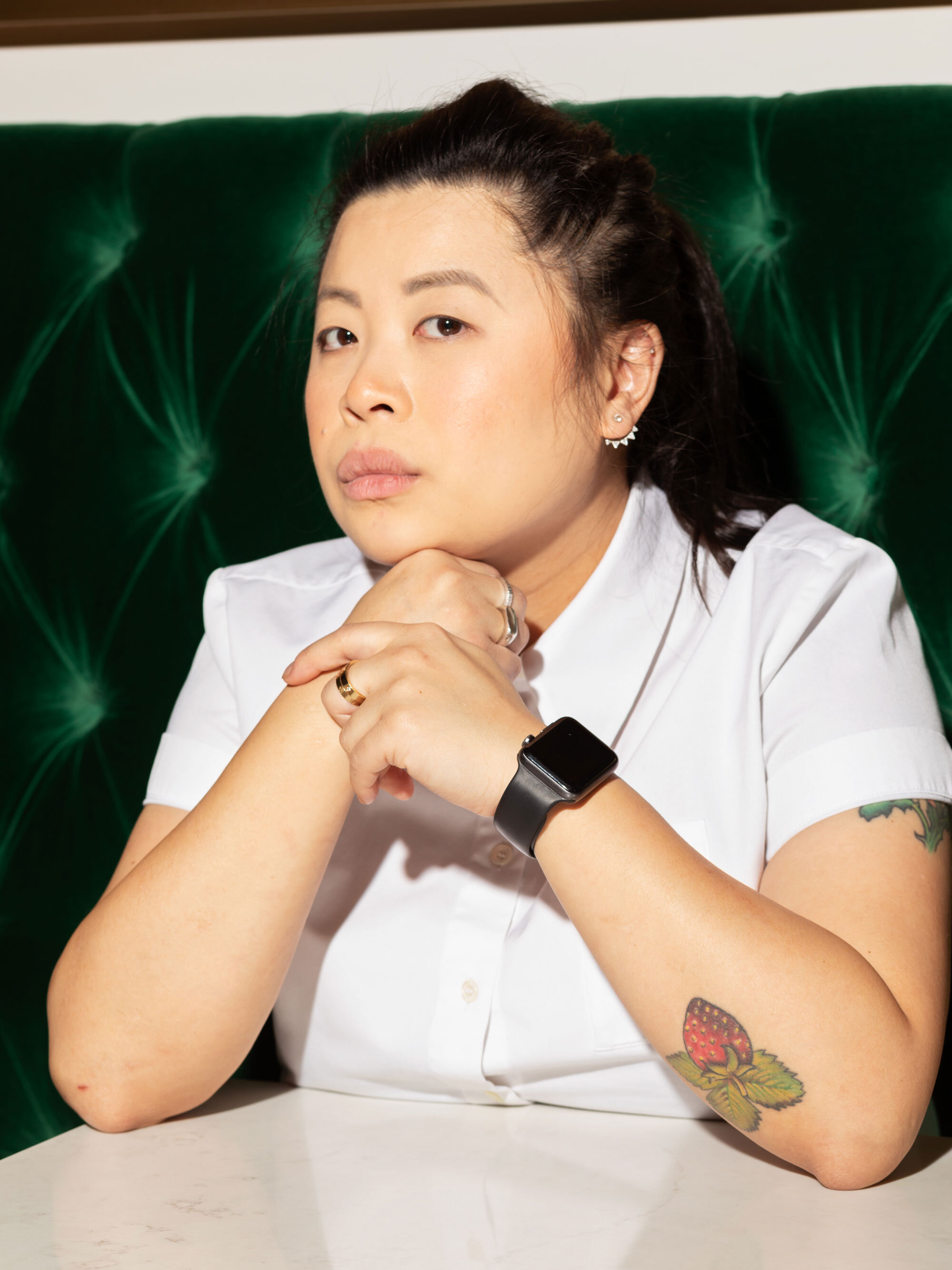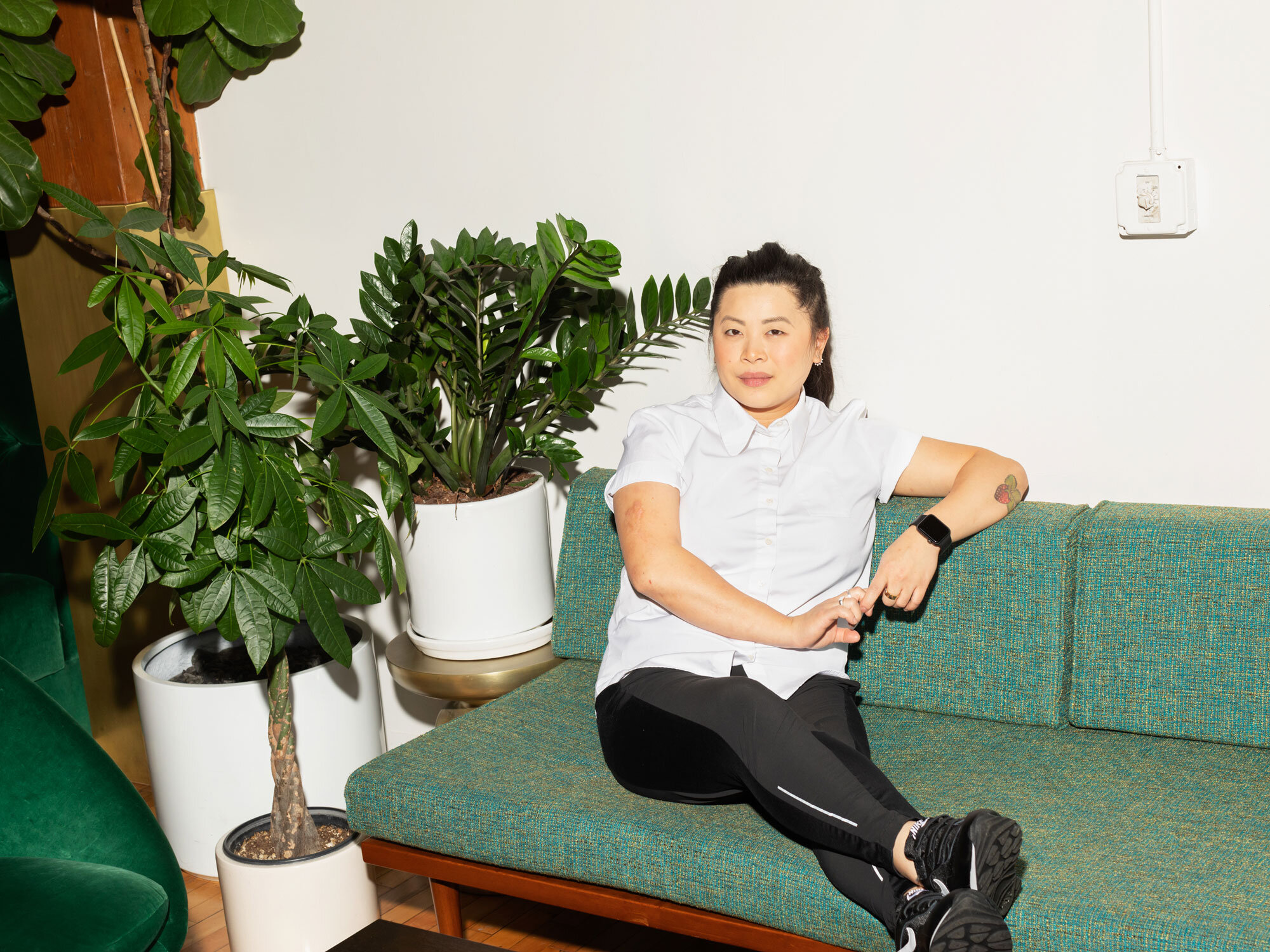WITH: MEi lin
We sit down with Top Chef winner and Nightshade chef-owner Mei Lin to talk about her almost-overnight rise to fame, why she took her time before opening a restaurant, and how she manages super-busy days — and even feelings of failure — as one of Los Angeles’ most in-demand chefs.
Photography by Maggie Shannon
WHAT MADE YOU BECOME A CHEF?
I grew up in restaurants. I started going to work with my dad when I was eight — I would help with small tasks in the kitchen. My parents opened up their own place when I was in my early teens, and I worked there, too. But I didn’t really decide to be a chef until my second year of college. I went to school for nursing, but realized that it wasn’t for me. Around that time, I was thinking a lot about what I like to do. My boyfriend suggested I go to culinary school — that was an “aha” moment for me. I dropped out of college and enrolled in a program the next day.
AND YOU WENT ON TO WORK FOR SOME REALLY BIG NAMES IN THE FOOD WORLD.
My first job was cooking for the Detroit Lions, and my second was cooking at Michael Symon’s Roast, also in Detroit. Later, I worked for Marcus Samuelsson at C-House in Chicago, Wolfgang Puck at Spago in Las Vegas, and Michael Voltaggio at Ink in Los Angeles.
“It’s a great show, and it taught me a lot about teamwork — and about myself and my potential. It taught me to be true to myself, and to not overthink things. That was the most important lesson I learned.”
on being on Top Chef
YOU WON SEASON 12 OF TOP CHEF — A HUGE ACCOMPLISHMENT. WHAT DID BEING ON TOP CHEF TEACH YOU?
It taught me resilience. Competing on a show like Top Chef is difficult and emotionally draining, but it’s a lot of fun, too. I wasn’t sure that I wanted to do it at first, but I slowly changed my mind as I got further along in the casting process, which is strenuous all on its own. You have to complete so many interviews and tests. If you can withstand it, it’s a good sign that you’re ready to do the show.
I wasn’t officially cast until a week before we started shooting in Boston. I was lucky to have Michael Voltaggio — who won Season 6 of Top Chef — as my mentor at that time. It’s a great show, and it taught me a lot about teamwork — and about myself and my potential. It taught me to be true to myself, and to not overthink things. That was the most important lesson I learned.
WHEN YOU WERE ANNOUNCED AS THE WINNER, YOU WERE THROWN INTO THE SPOTLIGHT ALMOST OVERNIGHT. WHAT WAS THAT LIKE?
It was really overwhelming. Social media wasn’t full throttle like it is now. I had 1,000 Instagram followers, and suddenly that number shot up to 20,000 — and I had a private account! I thought, “Whoa, this is crazy.”
When [Top Chef host] Padma Lakshmi announced me as the winner, I broke down. Competing on the show was very stressful and emotional, and I finally felt like I could let it all out.
I got to cook with the best of the best on Top Chef, and I got to compete in the finale with Gregory [Gourdet]. I learned a lot from him, and I think he learned a lot from me. That’s the premise of the show: learning about yourself and learning from the chefs around you. Gregory and I have a very strong friendship, and I really admire him as a chef.
AFTER TOP CHEF, YOU TRAVELED AROUND THE WORLD BEFORE OPENING YOUR RESTAURANT NIGHTSHADE. HOW DID NIGHTSHADE COME TO BE?
Nightshade was two years in the making. I spent a while fleshing out the concept. I actually wasn’t totally certain I wanted to open a restaurant, and it’s something you need to be very certain about, because it’s like having a baby — it’s a huge commitment. I decided to travel and get that out of my system before settling down.
When I returned to Los Angeles, I was approached by a lot of investors. I had a lot of meetings with a lot of people before I found partners whose vision for Nightshade aligned with my own.
If you’re seeking investment, it’s really important that you have the same ideas and values as your partners. It’s very cool for young chefs to have backing, but it’s critical to have a good relationship with the people who have invested in your restaurant. At one point, I felt pressure from someone to go in a direction that wasn’t right for me, and I knew we needed to part ways.
It took awhile for me to find the right partners, and it also took awhile for me to find the right space. Los Angeles is vast, and I wanted to be in a neighborhood that spoke to me as a person and a chef. I got lucky in finding this space, which is in the Arts District. It was really raw when I first saw it, and I knew right then and there that it was right.
“At one point, I felt pressure from someone to go in a direction that wasn’t right for me, and I knew we needed to part ways.”
on taking her time to find investors for Nightshade
HOW WOULD YOU DESCRIBE THE FOOD YOU COOK?
My food is about my upbringing and my culinary journey — I sometimes pay tribute to the restaurants I’ve worked in previously — but it’s also inspired by my travels. I combine flavors from my childhood with those I’ve enjoyed while traveling.
HOW DO YOU MANAGE YOUR DAY AS A BUSY CHEF? I’D LOVE TO KNOW ABOUT SOME OF THE DAY-TO-DAY OBSTACLES YOU FACE, AND HOW YOU OVERCOME THEM.
Each day is a little different. Wednesdays are my longest day. I wake up at 6 a.m. and head to the farmers’ market, where I pick up produce for the next four days — it’s a huge haul in my tiny car! When I get to the restaurant, I unload everything and do the flower arrangements, and then I start prepping for service. Once my sous chef gets in — usually around 11 a.m. — I go into the office to do paperwork. Really, cooking is the easy part; it’s managing a business that’s hard. We typically have a partners meeting around 2 p.m., and then it’s back to prepping. I make family meal, or someone else will. After that, we meet with the front-of-house staff. And then we start service. It’s a long day, but it’s so much fun, too.
I WANT TO TOUCH ON FAILURE, BECAUSE I THINK IT’S IMPORTANT TO BE TRANSPARENT ABOUT IF YOU WANT TO HELP OTHER PEOPLE LEARN AND GROW. I’D LOVE TO HEAR ABOUT THE LAST TIME YOU FELT LIKE YOU FAILED.
I honestly feel like I fail every day. I manage a team, and if I teach someone something, but feel like I can’t get the message across to that person, then I feel like I’ve failed. Being a chef is about being a leader, and it’s about teaching the next generation of chefs. If I can’t do that, then I’m failing the next generation — and I want a successor. I want to build that legacy.
ONE OF THE COOLEST THINGS ABOUT RESTAURANT KITCHENS — I THINK, AT LEAST — IS THE CULTURE OF CONSTANT LEARNING AND DEVELOPMENT.
I learn new things every day, too — not just my staff. The day you stop learning is the day you stop progressing, so you need to be willing to learn every single day.
YOU’VE CLEARLY WORKED VERY HARD TO GET TO WHERE YOU ARE TODAY. WHAT ADVICE WOULD YOU GIVE TO OTHER CHEFS WHO ARE TRYING TO HAVE A SIMILAR BREAKTHROUGH IN THE INDUSTRY?
Keep your head down. Be passionate, be eager to learn, and be a better listener. Everyone can be a better listener.










